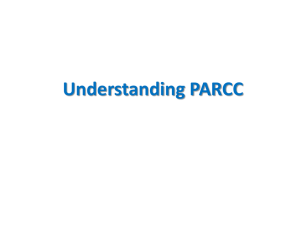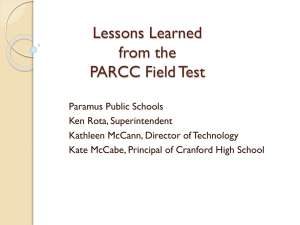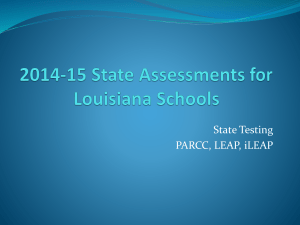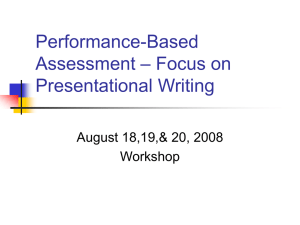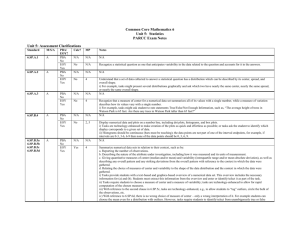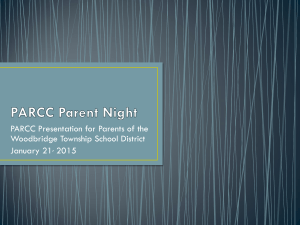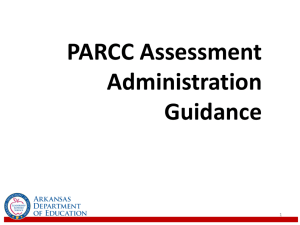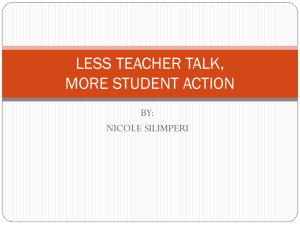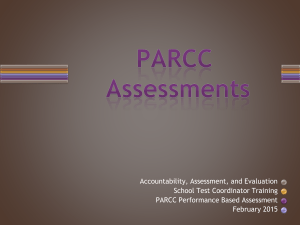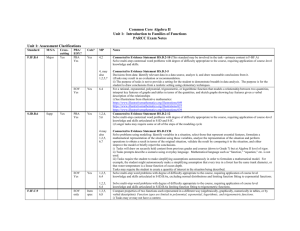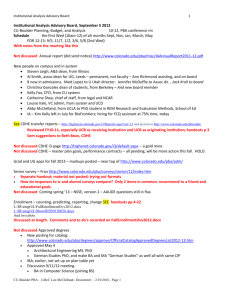parcc
advertisement
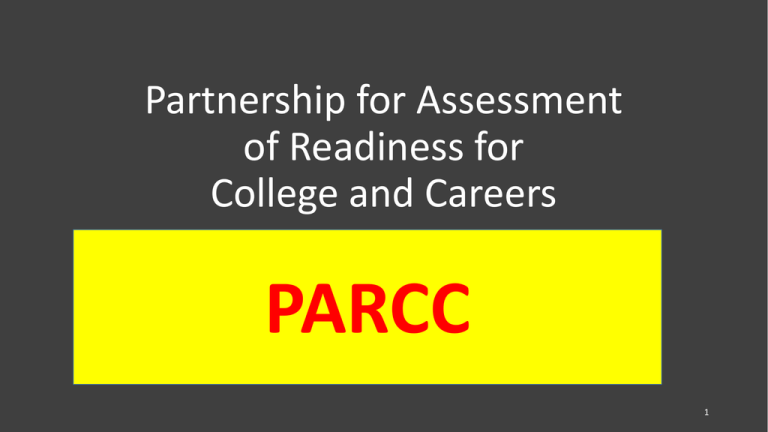
Partnership for Assessment of Readiness for College and Careers PARCC 1 Key Advances of the Common Core MATHEMATICS • Focus, coherence and clarity: emphasis on key topics at each grade level and coherent progression across grades • Procedural fluency and understanding of concepts and skills • Promote rigor through mathematical proficiencies that foster reasoning and understanding across discipline ENGLISH LANGUAGE ARTS/LITERACY • Balance of literature and informational texts; focus on text complexity • Emphasis on argument, informative/ explanatory writing, and research • Speaking and listening skills ANCHORED IN COLLEGE AND CAREER READINESS 2 What exactly is PARCC? • a group of states working together to develop a set of assessments that measure whether students are on track to be successful in college and their careers • computer-based K–12 assessments in Mathematics and English Language Arts/Literacy • designed to give teachers, schools, students, and parents better information about student learning and for potential success after high school • first full administration during the 2014-15 school year 3 Summative Assessment Components Performance-Based Assessment (PBA) • Administered after approximately 70% of the school year. • ELA/literacy PBA will focus on writing effectively when analyzing text. • Mathematics PBA will focus on applying skills, concepts, and understandings to solve multi-step problems requiring abstract reasoning, precision, perseverance, and strategic use of tools. End-of-Year Assessment (EOY) • Administered after approx. 90% of the school year. • ELA/literacy EOY will focus on reading comprehension. • Math EOY will be comprised of , machine-scorable items. ELA/Literacy Item Types Evidence-Based Selected response (EBSR) – (PBA and EOY) • Combines a traditional selected-response question with a second selected-response question that asks students to show evidence from the text that supports the answer they provided to the first question. Technology-Enhanced Constructed Response (TECR) – (PBA and EOY) • Uses technology to capture student comprehension of texts in authentic ways that have been difficult to score by machine for large scale assessments (e.g., drag and drop, cut and paste, shade text, move item to show relationships). Prose constructed Response (PCR) – (PBA Only) • Elicits evidence that students have understood a text or texts they have read and can communicate that understanding well in both terms of written expression and knowledge of language and conventions. There are three of these items of varying types on each annual performance based assessment. 5 ELA/Literacy Task Types (PBA Only) Literary Analysis Task • Carefully consider literature worthy of close study • Engage with text by answering a series of questions • Compose an analytic response to a prompt Research Simulation Task • Analyze an information topic through several articles or multimedia • Answer a series of questions • Synthesize information from multiple sources to write an argumentative or informative/explanatory response to a prompt Narrative Task • Write a story, detail a scientific process or write a historical account of important figures to describe an account of event, scenes or objects (examples) 6 Mathematics Task Types Type I – (PBA and EOY) • Balance of conceptual understanding, procedural fluency, and application Type II – (PBA only) • Call for written arguments and justifications Type III – (PBA only) • Modeling/application in a real-world context 7 Common Core Goals Reflected in PARCC Assessment ELA/Literacy Math Read sufficiently complex texts independently Solve problems: content and mathematical practice Write effectively to sources Reason mathematically Build and present knowledge through research Model real-world problems Have fluency with mathematics 8 www.parcconline.org 9
